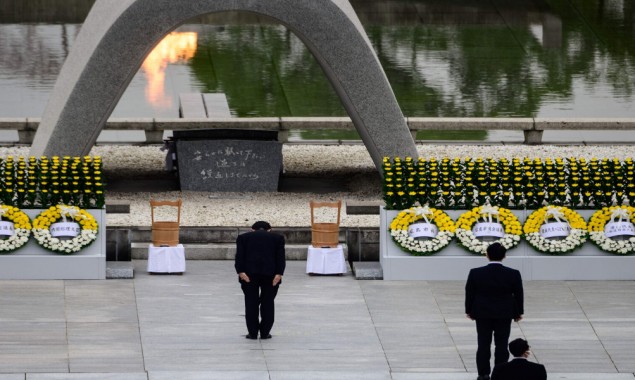
Japan marked 75 years since the world’s first atomic bomb with a sombre ceremony on Thursday to remember the victims of Hiroshima Nagasaki bombing.
Survivors, relatives and a handful of foreign dignitaries attended this year’s main event in Hiroshima to pray for those killed or wounded in Hiroshima bombing and call for world peace.
But the general public was kept away, with the ceremony instead broadcast online.
Participants, many of them dressed in black and wearing face masks, offered a silent prayer at exactly 8:15 am, the time the first nuclear weapon used in wartime was dropped over the city.
Speaking afterwards, Hiroshima mayor Kazumi Matsui warned against the nationalism that led to World War II and urged the world to come together to face global threats, like the coronavirus pandemic.
Japan’s Prime Minister Shinzo Abe, who has been criticized by some for his attempts to revise a key pacifist clause of the country’s constitution, pledged in his address to “do my best for the realisation of a world without nuclear weapons and peace for all time”.
And UN Secretary General Antonio Guterres, who addressed the gathering by video message because of the pandemic, warned that “the only way to totally eliminate nuclear risk is to totally eliminate nuclear weapons”.
The bomb attack on Hiroshima killed around 140,000 people, with others perishing in the weeks and months that followed, suffering radiation sickness, devastating burns and other injuries.
Three days later, the United States dropped a second atomic bomb on Nagasaki, where 74,000 people were killed.
The landmark anniversary this year underscores the dwindling number of bomb survivors, known in Japan as “hibakusha”, many of whom suffered physically and psychologically after the attack.
Those who remain were mostly infants or young children at the time, and their work to keep the memory of the bombings alive and call for a ban on nuclear weapons has taken on increasing urgency as they age.
Activists and survivors have created archives of everything from the recorded testimony of hibakusha to their poems and drawings.
Read More News On
Catch all the International News, Breaking News Event and Latest News Updates on The BOL News
Download The BOL News App to get the Daily News Update & Follow us on Google News.




